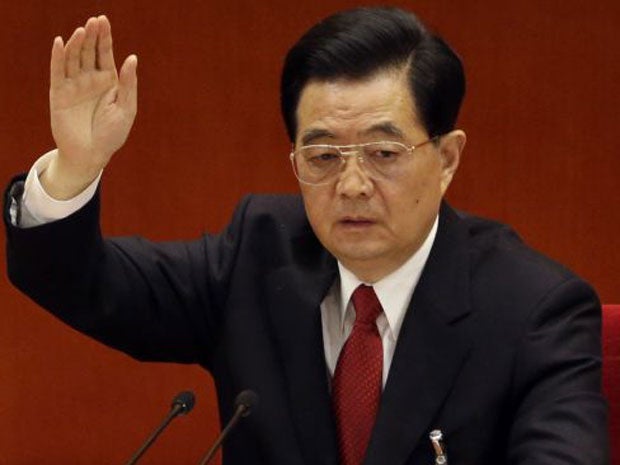Your support helps us to tell the story
From reproductive rights to climate change to Big Tech, The Independent is on the ground when the story is developing. Whether it's investigating the financials of Elon Musk's pro-Trump PAC or producing our latest documentary, 'The A Word', which shines a light on the American women fighting for reproductive rights, we know how important it is to parse out the facts from the messaging.
At such a critical moment in US history, we need reporters on the ground. Your donation allows us to keep sending journalists to speak to both sides of the story.
The Independent is trusted by Americans across the entire political spectrum. And unlike many other quality news outlets, we choose not to lock Americans out of our reporting and analysis with paywalls. We believe quality journalism should be available to everyone, paid for by those who can afford it.
Your support makes all the difference.China's president Hu Jintao has stepped aside as ruling party leader to clear the way for vice president Xi Jinping to take over as part of only the second orderly transfer of power in 63 years of Communist rule.
In a possible break from tradition, Mr Hu may also be giving up his post as head of the commission that oversees the military, which would give Mr Xi greater leeway to consolidate his authority when he takes over. A top general indicated Mr Hu would not stay on in the military post.
Mr Hu and other senior leaders mostly in their late 60s are handing over power to leader-in-waiting Mr Xi and other colleagues in their late 50s over the next several months. The new leadership faces daunting challenges including slowing growth in the world's No. 2 economy, rising unrest among increasingly assertive citizens and delicate relations with neighbouring countries.
In keeping with the widely anticipated succession plans, Mr Hu was not re-elected a member of the party's Central Committee on the final day of a pivotal party congress, showing that he is no longer in the leadership.
Delegates said they cheered when the announced results of secret balloting showed that Mr Xi had been unanimously chosen for the committee, a step toward being named to the topmost panel, the Politburo Standing Committee, and becoming party leader as expected on Thursday. Li Keqiang, designated as the next premier, also was elected to the Central Committee of about 200 members.
As the final day of the weeklong congress drew to a close in the Great Hall of the People, and after reporters were invited in to watch the proceedings, Mr Hu reminded party leaders of the "glorious mission and heavy responsibilities" entrusted to them.
"We must strive to be role models, bring out our best in working for the cause of the party and the country," he said.
Sitting on the dais next to Mr Hu was his predecessor, 86-year-old Jiang Zemin, who has emerged as a key power-broker, manoeuvring his allies into the leadership at the expense of Mr Hu.
China's leadership transitions are always occasions for fractious backroom bargaining, but this one has been further complicated by scandals that have fed public cynicism that their leaders are more concerned with power and wealth than government.
In recent months, Bo Xilai, a senior politician seen as a rising star, was purged after his aide exposed that his wife had murdered British businessman Neil Heywood. An ally of Mr Hu's was sidelined after his son died in the crash of a Ferrari he should not have been able to afford. And foreign media recently reported that relatives of Mr Xi and outgoing premier Wen Jiabao have amassed vast wealth. The scandals have weakened Mr Hu, on whose watch they occurred.
Mr Hu took over as party boss in 2002 in the first power transfer that did not involve the death of a leader or the unseating of a designated successor.
He will remain in the largely ceremonial post of president until March.
PA

Join our commenting forum
Join thought-provoking conversations, follow other Independent readers and see their replies
Comments